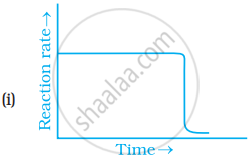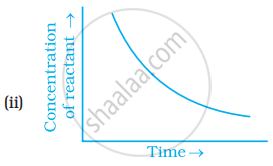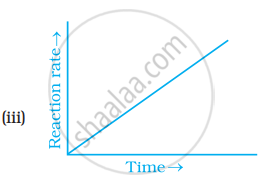Advertisements
Advertisements
प्रश्न
Write the rate equation for the reaction `2A + B -> C` if the order of the reaction is zero.
उत्तर
Given: Order of the reaction = 0
We know that a zero-order reaction is a chemical reaction that occurs regardless of the reactant's concentration.
The rate equation for the reaction `2A + B -> C`
r = k[A]0[B]0
For a zero-order reaction
APPEARS IN
संबंधित प्रश्न
The reaction between A and B is first order with respect to A and zero order with respect to B. Fill in the blanks in the following table:
| Experiment | A/mol L−1 | B/mol L−1 | Initial rate/mol L−1 min−1 |
| I | 0.1 | 0.1 | 2.0 × 10−2 |
| II | ______ | 0.2 | 4.0 × 10−2 |
| III | 0.4 | 0.4 | ______ |
| IV | ______ | 0.2 | 2.0 × 10−2 |
The decomposition of NH3 on a platinum surface is a zero-order reaction. If the rate constant (k) is 4 x 10-3 ms-1, how long will it take to reduce the initial concentration of NH3 from 0.1 M to 0.064 M?
Which of the following graphs is correct for a zero order reaction?




Derive an expression to calculate time required for completion of zero order reaction.
For a zero order reaction will the molecularity be equal to zero? Explain.
For a zero-order reaction, the plot of [A]t vs t is linear with a ______
The slope in the plot of [R] Vs. time for a zero-order reaction is ______.
Assertion (A): For a zero-order reaction, the unit of rate constant and rate of reaction are same.
Reason (R): Rate of reaction for zero order reaction is independent of concentration of reactant.
If the initial concentration of substance A is 1.5 M and after 120 seconds the concentration of substance A is 0.75 M, the rate constant for the reaction if it follows zero-order kinetics is ______.
What is zero order reaction?
